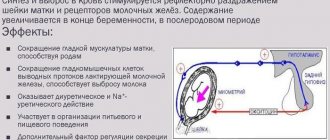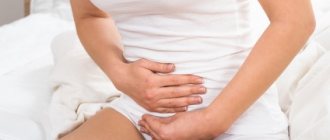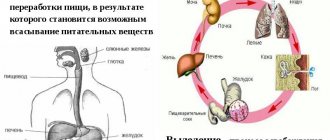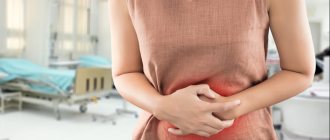Most people are familiar with the phenomenon of bloating, which occurs against a background of heaviness, increased gas production, and pain. The causes of this condition are usually attributed to improper, irrational nutrition, errors in diet and stressful situations. In some cases, gentle diet therapy is sufficient to eliminate unpleasant symptoms. Medications may also be required.
In women, bloating may be associated with hormonal changes. It is observed during PMS, during menstruation, and during pregnancy. If bloating occurs during the ovulatory phase or on the first or second days of the cycle, the cause is most likely interstitial fluid retention. At this time, women's face and limbs swell, they are tormented by severe thirst, and transformations in the activity of the central nervous system are observed. Among the accompanying symptoms, irritability and insomnia should be noted.
Pathological problems
A slight increase and bloating in the abdomen before menstruation is quite natural.
However, if this process is accompanied by pain, spasms, stool disturbances, the appearance of rumbling and gas formation, then we can talk about the appearance of pathology in the peritoneum. What kind of pathology has appeared can only be determined by a specialist. Often a woman attributes symptoms of a disease to premenstrual syndrome. It is worth closely monitoring your health and visiting a gynecologist in a timely manner.
Diseases that cause bloating during menstruation are the following:
- colitis or gastroduodenitis or colitis. These diseases are usually chronic in nature, rarely manifesting acute symptoms. A rush of blood to the abdominal cavity and bloating provoke the appearance of gas, constipation, diarrhea, cramps, pain, and pressure on the walls of the abdominal cavity.
- adhesions and inflammatory processes in the pelvic organs. These diseases can cause bloating before menstruation, accompanied by pain, cramps, and rumbling in the abdomen. At the same time, the stool remains normal.
- kidney diseases. This condition is characterized by fluid retention in the body, including before critical days. At the same time, the lower abdomen begins to swell, lower back pain appears, blood pressure rises, and the woman’s general well-being worsens.
Intestinal diseases can also cause bloating and distension in the abdomen. For such diseases, it is worth adjusting your diet by eliminating certain foods and giving up bad habits. Abundant nutrition should also be reconsidered, replacing it with fractional, gentle ones. Eating foods that retain water in the body and thereby cause swelling is unacceptable.
If you feel normal, you can play sports. Walking during menstrual periods is very useful.
7 days before the onset of menstruation, in order to avoid bloating and flatulence, it is recommended to take an infusion of dill seed or fennel, and take enterosorbent medications 2 times a day.
During menstruation, in the absence of severe cutting pain, you can do abdominal massage or breathing exercises. This will stimulate abdominal blood circulation and normal digestion. Self-massage of the peritoneum is done in this way:
- standing or sitting, take a deep breath, protruding the peritoneum as much as possible, exhale the air smoothly, pulling the muscles inward, repeat up to five times;
- lying on your back, massage the abdominal area with wide circular movements for 3 minutes clockwise, using two palms.
Any woman should always closely monitor any changes and behavior of the body. For some, these may be ordinary symptoms of PMS, but if this has not been observed before, it is recommended to undergo an examination by a gynecologist.
Common problems:
- Inflammation of the genitourinary system.
- Disruption of the gastrointestinal tract.
- Tumors in the pelvic organs.
You especially need to be wary if, in addition to an enlarged abdomen, other accompanying symptoms appear: nausea, vomiting, fever, frequent urination, pain in the lower part of the peritoneum, intense discharge during menstruation.
His body “talks” to every person and reports problems. You just need to listen to him. An enlarged abdomen is one such sign.
If there are no periods or pregnancy, but the symptom does not go away, then this indicates a pathological process.
The main problem is that internal factors are not visible to the normal eye. One can only make assumptions.
A specialist can determine the exact reason why bloating occurs during menstruation. A woman notices only external changes. This is an enlarged belly and extra pounds.
Before menstruation, the stomach swells for natural reasons: due to changes in the composition of hormones, enlargement of the uterus, edema, increased appetite and slight weight gain.
In this case, the woman does not have to suffer much, in addition, the symptoms disappear quite quickly.
And if in the second half of the cycle you don’t eat sweets, salty foods, legumes, take vitamins, eat small meals, you can avoid the problem.
But the culprits for the increase in abdominal volume and bloating may be gynecological or gastroenterological diseases, inflammation of the bladder, pregnancy, both normal and ectopic. It is necessary to note other symptoms (fever, vomiting, diarrhea, weakness), if any, and go to the doctor.
Before menstruation, many women feel their stomach swell, and the culprits include:
- changed hormonal levels (this is of particular importance in those who are overweight, physically weak, or nervous);
- tumor or inflammatory diseases of the uterus, ovaries;
- pregnancy;
- gastritis, colitis, enteritis;
- pathologies of the urinary system;
- binge eating;
- swelling.
Pelvic organs
Often, for the same reasons, the stomach also rages and hurts before menstruation. And some women gain weight, which is obvious from their increased waist circumference.
| Cause | Why is this happening? |
| It is the imminent appearance of menstruation. | At this stage of the cycle, hormonal changes occur, bringing with them new external signs (rounding of the abdomen, slight swelling on the face and fingers) and sensations (discomfort, irritability, increased appetite, cravings for sweets). |
| Problems in the reproductive system. | These could be tumors on the uterus, ovaries, or endometriosis. The rapid arrival of menstruation can provoke an exacerbation, since the main female organ in this period increases in size, its muscles begin to contract more actively. |
| Intestinal dysfunction. | Colitis and enteritis are also characterized by bloating, and tend to worsen in the premenstrual period. |
| Chronic cystitis. | Decreased immunity before menstruation can cause an exacerbation of the disease. But then problems with urination are added to other symptoms. |
| Weight gain. | Before menstruation, many women's appetite increases and their interest in sweets awakens. So in a short time you can “eat up” a couple of extra pounds, which, due to the characteristics of your physique, are localized on the stomach. In addition, sugar creates favorable conditions for fermentation processes in the intestines, hence flatulence. |
In a word, if before menstruation the stomach swells, ache and enlarges, this may turn out to be both the norm and a sign of trouble. It all depends on the severity of the manifestations and accompanying symptoms.
Physiological pain
Why does the lower abdomen and lower back feel tight after menstruation? The reason may be hidden in the structure of the internal organs. Often, such sensations intensify during bleeding and subside towards the middle of the cycle. Doctors say that after the birth of a child, such pain goes away on its own.
The main causes of such discomfort are hidden in the bending of the uterus, the formation of a septum and other ailments.
What if I'm pregnant?
If your period has not arrived and your stomach is swollen, then you should take a pregnancy test or donate blood for hCG.
If pregnancy is confirmed, but discomfort remains, then it is worth visiting a gynecologist to rule out pathologies, including ectopic pregnancy or miscarriage. During a normal pregnancy, a woman should not be bothered by pain.
In addition to bloating, pregnancy is accompanied by other symptoms:
- breast swelling;
- loss of strength;
- spasms and pain;
- dizziness.
It is worth noting that menstruation does not always stop during pregnancy - brown spotting may appear.
The main difference between a belly swollen before menstruation and a belly swollen during pregnancy is that in the latter case, upon palpation, the belly feels hard to the touch.
This reason is quite real. Sometimes, the onset of pregnancy can be confused with PMS. During this period, the female body produces the hormone progesterone.
It prepares the reproductive organs for bearing a child. With the onset of pregnancy, changes occur within the woman.
The egg enters the uterus and attaches to the wall (endometrium). This process is otherwise called implantation. Progesterone affects the endometrium.
It expands, absorbs nutrients and loosens. In turn, this causes the innermost lining of the uterus to swell and the abdomen begins to enlarge.
Uterine fibroids or polyp
Why does the lower abdomen still feel tight after menstruation? This may be due to a tumor located directly in the cavity of the reproductive organ. Often this is a fibroid or polyp. It is worth noting that the latter formation has a chance to appear in the cervical canal. In this case, the pain may be more acute.
With these pathologies, the fairer sex may experience increased bleeding. That is why, if you experience heavy periods and pain after them, you should immediately consult a doctor. Perhaps you are dealing with a tumor process in the cavity of the reproductive organ.
Bloat during ovulation
For many women, bloating occurs in the middle of the menstrual cycle, during the period of ovulation - the release of a mature egg from the ovary. Ovulation itself is a painful process, since it is associated with rupture of the follicle.
It is not uncommon to experience weakness, loss of strength, enlargement of the abdominal cavity, flatulence, a feeling of fullness in the abdominal cavity, and nagging pain.
During a normal menstrual cycle, such symptoms do not last long and do not cause severe discomfort to the woman. If such symptoms appear for the first time or their severity has become stronger, it is worth visiting a doctor, since ovulation may be accompanied by intestinal diseases or metabolic disorders in the body.
Folk remedies
Traditional medicine helps not only to cope with bloating, but also to prevent the occurrence of this symptom.
It is recommended to use decoctions and infusions of the following herbs:
It should be remembered that the use of any herbs is possible only in the absence of allergic reactions and after consultation with your doctor. When using traditional medicine, reviews from women are in most cases positive.
Bloating before menstruation, what to do and reasons
If there is no doubt that the symptom is associated with the onset of menstruation, then there are still some tips and solutions. First of all, you need to look at your diet.
If you eat right, you can solve many problems and bloating is one of them.
During this time, the body stores fluid to replenish blood loss. It is worth limiting your salt intake.
When a person eats salty foods, sodium accumulates in the body. This element prevents the removal of fluid.
It is also recommended to limit sweets. Sugar, like salt, causes sodium to accumulate inside and also increases glucose levels. Bloating can only be avoided if you reduce your intake of both.
To prevent the body from lacking fluid and accumulating it, you need to constantly drink fresh water. It is recommended to drink at least 2 liters.
This will help ensure constant fluid renewal, elimination of toxins and good digestion. Raw vegetables and fruits will also help replenish fluid in the body.
What should you not do during your period? Alcohol should be banned. Such drinks cause increased gas formation and nagging pain below.
Dairy products can also affect a woman’s condition during PMS.
For good digestion you need fiber. It is found in cabbage, greens, legumes, bran, berries and mushrooms. It is not recommended to introduce them into the diet abruptly.
You need to gradually increase the daily dose. The norm is 25 grams per day during menstruation.
Traditional medicine advises preparing special decoctions for this period. Infusions from:
- Lingonberries and cranberries.
- Daisies.
- Mint.
Good health is possible if you follow simple recommendations that have been developed throughout your life.
If a woman wants to reduce the feeling of discomfort, then she needs to create a suitable daily routine with the right diet.
Walking in the fresh air helps cope well with unpleasant symptoms. Walking in the evening will be especially effective.
Women notice an increase in their abdomen before menstruation (usually 1.5-2 weeks). This feature leads to despair, complicates life and spoils the mood. The reasons for this behavior of the body can be explained by the peculiarities of a woman’s physiology.
Causes
- Progesterone (female hormone), from cycle to cycle, carefully prepares all systems for conception and subsequent successful gestation. He cannot “know” whether the married couple is planning the birth of an heir or is just preparing for this important step. Under the influence of the hormone, the inner mucous membrane of the uterus (endometrium) grows.
This area is like a loose, porous sponge containing a large number of blood vessels. It is they who will supply the embryo with all the necessary nutrients and vitamins if the process of maturation of the egg goes to the very end and it meets the sperm.
A heavily swollen uterine wall gives extra volume to the abdomen during menstruation. If fertilization does not occur, progesterone production will decrease and the endometrium will immediately begin to exfoliate intensively.
12-13 hours after the start of bleeding, the uterus returns to its original size, and the volume of the abdomen becomes the same.
The monthly blood loss is not great. A healthy body replenishes it without difficulty. It is thanks to such training that blood loss due to various injuries or pathological changes is less dangerous for women than for men.
- To compensate for blood loss, nature has developed a system for accumulating internal fluid. The hormones estrogen and prolactin slow down the circulation of water in a woman’s body, and vasopressin has an antidiuretic effect (reduces the number of urinations). Water begins to collect in all cavities accessible to it. Swelling goes away with the end of the menstrual cycle. Different parts of the body can swell and inflate: legs at the ankles, feet and hands;
- face (cheeks, nose and even ears);
- stomach and buttocks.
- An increase in blood flow into the endometrium of the uterus affects the blood supply to other organs in the pelvic area. This is expressed in upset stomach function, flatulence and bloating (due to the intestines).
- The same hormone progesterone affects the nervous system. It is thanks to him that all women, without exception, a week before menstruation, have a strong desire to eat (mainly sweet, fatty and starchy foods), cry or behave aggressively. This behavior is the reason for a couple more centimeters on the waist and stomach.
- In the very middle of the cycle, the belly may increase due to ovulation. When an egg leaves the ovary into the uterus, it is a minor injury, but still a trauma, and many women endure it painfully. It is not necessary to endure this condition resignedly; it is quite acceptable to take a painkiller. But if you have persistent, strong symptoms, you shouldn’t be frivolous—you need to see a doctor.
During menstruation, the body undergoes a huge number of changes and transformations. Each internal organ works under heavy load. During a specific period of the cycle, the stomach may swell for various reasons or due to their complex effects.
The combination of the close onset of menstruation and eating and lifestyle habits can seriously let down both young girls and adult women. No less rarely, pharmaceutical drugs taken cause the stomach to swell. Do not self-medicate or take medications without consulting a doctor.
Pelvic endometriosis
If your lower abdomen feels tight after your period, brown discharge may indicate the development of endometriosis. With this process, the uterine mucosa grows where it should not be. The abdominal wall, ovaries and fallopian tubes are most often affected. Less commonly, the endometrium grows on the intestines and adrenal glands. There are cases where pathological tissues were found on the lungs.
During menstruation, bleeding develops not only in the uterine cavity, but also in pathological areas. Abdominal pain occurs due to fluid entering the peritoneal cavity. At the same time, menstruation becomes more protracted. At the end and beginning of menstruation, bleeding with a brown tint is observed.
Nutrition
A feeling of bloating or distension in the abdomen may be associated with the appearance of gases in the intestines. When eating foods that contribute to the appearance of edema and flatulence, the stomach swells, rumbling appears, and a feeling of fullness in the abdominal area appears. A few days before the onset of menstruation, it is worth excluding from the diet:
- legumes;
- sugar;
- sweet dishes;
- milk;
- black bread;
- fresh white cabbage;
- celery;
- peanut;
- smoked;
- hot and spicy dishes;
- salty:
- fried meat, fish;
- carbonated drinks;
- strong coffee.
It is necessary to exclude overeating and consumption of harmful foods. The diet should include 4-5 meals. Alcohol promotes gas formation, so it should also be avoided.
Prevention of an unpleasant condition
If your stomach becomes larger during menstruation, flatulence and other unpleasant sensations appear, it is important to pay attention to the food that is regularly present in the diet. To prevent bloating you need to:
- Avoid excess salt. Minimize salting of dishes, exclude canned food, homemade preparations, salted fish, nuts and other snacks. Salt retains water and causes severe bloating.
- Reduce your consumption of sweets. Sugar, like salt, can cause bloating and provoke sodium deposition.
- Increase your water consumption. It is necessary to drink herbal teas and non-carbonated liquids. It removes harmful substances and improves metabolism. You can increase your fluid intake by increasing the amount of fruits and vegetables in your diet.
- Avoid caffeine. This substance provokes bloating and flatulence, so green tea and coffee should be consumed in limited quantities.
- Increase the amount of foods with vitamins A, E, B. Red berries, mint tea, fermented milk products, unrefined olive oil.
Alcohol is another provocateur of digestive and intestinal problems. It needs to be eliminated or significantly limited. To improve digestion, vegetables, bran, mushrooms, berries and greens in small quantities will be useful.
It is necessary to eat during and after menstruation in small portions and regularly, excluding overeating. It is also important to combine the principles of proper nutrition with activity - walk more often, play sports if possible.
Bloating can appear for various reasons, and they are not always associated with pathologies. Many women suffer from symptoms during their periods that are caused solely by hormonal changes.
Conclusion
Knowing your body comes with experience. At a young age, a woman is just learning to understand herself. Over time, it will become clear what is a natural expression of physiology. What to do about bloating?
If this problem causes discomfort, then you can find a solution and take some preventive measures.
Gas formation is often caused by improper bowel function, which is disrupted by the release of hormones. To avoid this, you need to monitor your diet and reduce the load on the gastrointestinal tract.
Doctors' advice
Doctors advise women who are prone to bloating before menstruation to undergo an examination to find out if there are any associated pathologies. This condition may indicate diseases of the intestines, pelvic organs, or metabolic disorders. It is worth visiting an endocrinologist, urologist and cardiologist, since it is necessary to exclude the presence of diseases such as neoplasms of the pelvic organs, heart disease, and tumors in the body.
For bloating, many experts recommend:
- switch to proper nutrition, eliminate salty, smoked and spicy foods, alcohol and carbonated drinks. Meals should be healthy and fractional;
- avoid foods that cause swelling;
- Before critical days, you should take a warm bath with black pepper or fennel oil. But when your period begins, you should stop taking warm baths to avoid bleeding;
- wear loose clothing, avoid tight belts, slips and corsets;
- take a course of B vitamins, magnesium and potassium;
- be sexually active;
- lift your spirits;
- take a decoction of cranberries, lingonberries or chamomile.
You shouldn’t deny yourself small joys - it’s not forbidden to boost your mood with a piece of dark chocolate or banana. A sedentary lifestyle can be harmful - you should take walks, swim, and exercise. You should not immediately set sports records - this can harm a woman’s body. A positive outlook on life, joy from communicating with friends and relatives, smiling and laughter can ease the course of premenstrual syndrome.
Your doctor may prescribe a medication that will reduce pain, bloating, and gas. There are also a number of folk recipes that help with these problems, but they should only be taken with the consent of the attending physician. As a last resort, you can drink chamomile tea. You should never self-medicate.
Results
The most common cause of bloating before your period is a problem with your intestines.
Intestinal diseases can cause gas formation, flatulence, rumbling, stool disturbances and other unpleasant symptoms. Proper nutrition, keeping the body hydrated, moderate exercise and massage can cope with this problem. However, if acute cutting pain occurs, you should immediately seek medical help.
Common premenstrual syndrome accompanies many women today. The symptoms of this condition are always unpleasant, sometimes painful, cause stress and mental tension, as well as serious discomfort.
One of these symptoms is bloating, which is accompanied by a constant feeling of heaviness in the pelvic area and flatulence. Moreover, such manifestations accompany a woman, both before and during menstruation. Let's look at the main causes of bloating and gas in women.











